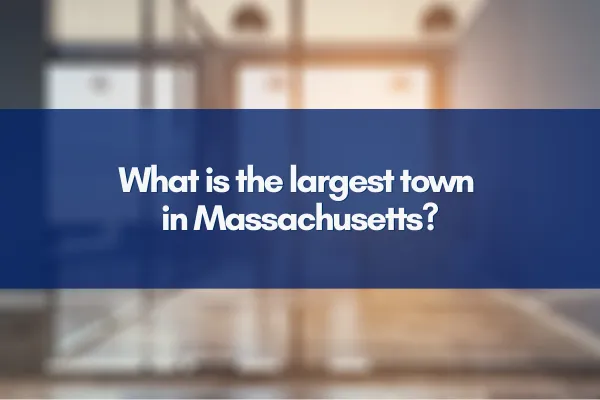How Much Is Your Home Worth?
BLOG

What is the largest town in Massachusetts?
What is the Largest Town in Massachusetts?
When you ask, "What is the largest town in Massachusetts?" you’ve probably conjured up images of sprawling neighborhoods, bustling commercial centers, or perhaps historic colonial charms. It’s a question that goes beyond mere numbers—it’s a glimpse into the very fabric of Massachusetts’ diverse communities.
Let's unpack the story behind the largest town in Massachusetts, how it compares with cities, and shed light on one of the gems: Hingham, MA.
Understanding Towns vs. Cities in Massachusetts
First off, here’s a quick teaching moment: In Massachusetts, the distinction between towns and cities isn’t about size alone. It largely hinges on the form of government. Towns generally operate under town meetings and boards of selectmen, whereas cities have mayors and city councils.
So, the “largest town” by population might surprise you—it’s not necessarily the largest population in the state (usually a city holds that title).
Largest Town in Massachusetts by Population: Lexington, MA
Drumroll… The largest town in Massachusetts, measured by population, is Lexington, MA.
Here’s what makes Lexington stand out:
Population: About 33,000 residents (2023 estimates)
Location: Middlesex County, conveniently close to Boston
Famous for: Birthplace of the American Revolution, rich history
Lexington managed to grow steadily, embracing suburban expansion without sacrificing its historic character. It’s a fascinating example of how town governance can still accommodate robust growth.
How Does That Compare with Cities?
Massachusetts’ biggest cities dwarf any town. Boston is king with almost 700,000 residents, followed by Worcester, Springfield, and Lowell—all cities, not towns. But the story of towns like Lexington or Hingham, MA holds incredible charm, lifestyle advantages, and often, strong community focus.
Spotlight on Hingham, MA: A Town Worth Knowing
You might have heard of Hingham, MA—and if you haven’t, here’s why it deserves your attention:
Population: Roughly 24,000 residents
Location: Coastal town on Boston Harbor’s southern shore
Known for: Scenic waterfront, historical sites, and community events
Hingham blends seaside vibes with a rich New England history. From its historic shipbuilding past to modern-day amenities, Hingham is a wonderful example of a mid-sized Massachusetts town balancing heritage and growth.
Why Knowing the Largest Town Matters to You
Here’s where the story gets practical: whether you’re relocating, investing, or simply curious—understanding towns like Lexington and Hingham can shape your perspective on Massachusetts living. Town size can impact:
Property values and availability
Community activities and town governance
Proximity to urban centers and natural attractions
A Closer Look: The Data Behind the Numbers
According to recent Massachusetts demographic studies, population growth in towns like Lexington and Hingham has been steady but deliberate—reflecting zoning policies favoring single-family homes and preservation of open spaces. Contrast this with rapid urban growth in Boston or Cambridge cities, which attract denser development.
The Town Lifestyle: Why People Choose Towns Over Cities
Think of towns as the cozy cafés to the bustling cities’ coffee chains:
Community Spirit: Town meetings invite residents to a seat at the table.
Pace of Life: Slower, often more connected to nature and neighborhood ties.
Space & Recreation: Larger yards, parks, and often closer access to trails or beaches (as in Hingham).
If Hingham, MA is any clue, the allure of a town lifestyle is strong, especially for those who want a mix of history, nature, and community without sacrificing access to Boston.
Frequently Asked Questions
Q1: What defines a town versus a city in Massachusetts?
A1: It depends on government structure. Towns have town meetings or boards, cities have mayors and councils.
Q2: Is Hingham, MA larger than Lexington?
A2: No, Lexington has approximately 33,000 residents, while Hingham is about 24,000.
Q3: Can a town become a city?
A3: Yes, through a change in government charter, but population doesn’t mandate the change.
Q4: Why are some large places still called towns?
A4: Tradition and local government preferences keep the 'town' designation despite population size.
Stories from Massachusetts Towns: A Peek Into Local Character
Let’s imagine this: a warm summer evening in Hingham, MA — the scent of salty sea air mingling with fresh lawn grass. Families stroll along the harbor, kids run to catch the last glimmer of sunset, and community bands play at the town center.
This scene isn’t just Americana; it’s a distinctive Massachusetts town vibe. Whether it’s Lexington’s Revolutionary War reenactments or Hingham’s waterfront festivals, these towns keep history lively, not locked in dusty archives. This is the magic behind the “largest town in Massachusetts”—it’s not just about numbers but living stories.
What’s Next? Exploring Massachusetts Towns for You
If you're considering moving or investing in Massachusetts, size matters—but it’s not the whole story! Look beyond population metrics and explore local governance, community vibe, and amenities. Towns like Hingham, MA, offer a unique blend of history, quality of life, and strategic location that cities sometimes can’t match.
Don’t just settle on the “largest town in Massachusetts” title—dive into what makes each town tick. Your perfect Massachusetts town might just be one you haven’t encountered yet.
Let’s keep this conversation going! Have you visited or lived in Hingham, Lexington, or other Massachusetts towns? What stood out to you? Drop a comment below and let’s share stories!
And if you want personalized insights or want to explore available properties in towns like Hingham, reach out anytime.
📞 Contact: Alice Pierce
📍 Title: Realtor
📲 Phone: 781-724-7622
📧 Email: [email protected]
🌐 Website: https://alicepierce.com
Remember: GreatSchools.org is a good resource for academic information in any district you consider, and for legal, tax, or financial advice, please consult professionals licensed in those fields.
Explore, discover, and enjoy the wonderfully diverse towns of Massachusetts!





